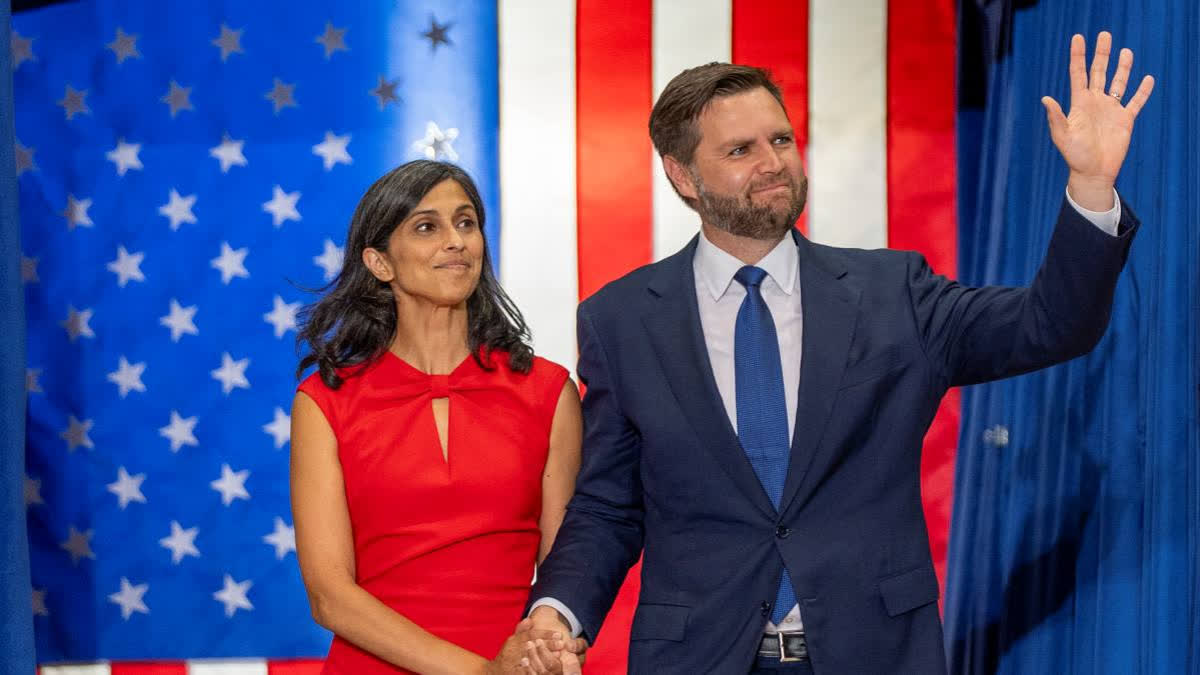Wisconsin:Usha Chilukuri Vance loves her "meat and potatoes" husband, JD Vance. She explained to a rapt Republican National Convention audience how their vice-presidential candidate adapted to her vegetarian diet and even learned to cook Indian food from her immigrant mother.
That image of her white, Christian husband making the spicy cuisine of her parents' native state in South India is atypical for the leaders of a party whose members are still largely white and Christian. Her presence at the RNC sparked enthusiasm on social media among some Indian American conservatives, particularly Hindu Americans, although most Indian-Americans identify as Democrats.
But for all Usha Vance shared about their identity-blending marriage in her speech last month in Milwaukee, which was a little over four minutes, she made no mention of her Hindu upbringing or her personal faith and their interfaith relationship – biographical details that have exposed her to online vitriol and hate.
While some political analysts say her strong presence as a Hindu American still makes the community proud, others question whether the Republican Party is really ready for a Hindu second lady.
Usha Vance is choosing to remain silent about her religion in the run-up to the election and declined to speak with The Associated Press about it. She opted not to answer questions about whether she is a practising Hindu or if she attends Mass with her Catholic husband, an adult convert to the faith, or in which faith tradition their three children are being raised.
Brought up in San Diego by immigrant parents, both professors, in a Hindu household, Usha Vance did confirm that one of their children has an Indian name, and she and JD Vance were married in both "an Indian and an American wedding." The pair met as students at Yale Law School.
Her Hindu background could appeal to some South Asian voters, which might add value in swing states with larger South Asian communities like Arizona, Georgia and North Carolina, said Dheepa Sundaram, a Hindu Studies professor at the University of Denver. Sundaram says that while some Indian and Hindu conservatives may be eager to embrace Usha Vance, that doesn't appear to be part of the party's public-facing strategy.
"To me, it seems like her Hindu identity is more of a liability than an asset," she said. "It also feels like the campaign wants to have it both ways: Usha may be Hindu, which is great, but we don't want to talk about it."
Sundaram said Usha Vance would appeal particularly to those Hindu Americans who support the politics of Indian Prime Minister Narendra Modi, under whom Hindu nationalism has surged.
There are deep divisions within some Indian American communities over issues such as taxes, education, relations with India and anti-caste discrimination legislation that gained momentum in Seattle and California. Caste is a division of people based on birth or descent and calls to outlaw-related discrimination are growing in the U.S.
About 7 in 10 Indian Americans identify with or lean toward the Democratic Party, while about 3 in 10 identify with or lean toward the Republican Party, according to Pew Research Center surveys conducted in 2022 and 2023. AAPI Data/AP-NORC surveys from earlier this year found that less than 1 in 10 South Asian Americans trust the Republican Party over the Democrats on key issues like abortion, gun policy and climate change, while around half or more trusted the Democratic Party more than the Republicans.
Still Usha Vance, "a second lady who looks like us and speaks like us," may help capture the attention of a block of voters that has been challenging for Republicans to reach, said Ohio State Sen. Niraj Antani, a Republican and Hindu American who is the youngest member of the state senate.
"If Republicans don't reach out to minority groups, we will lose elections."
